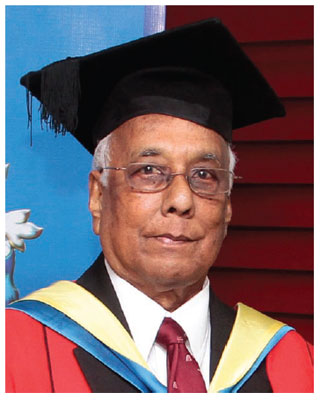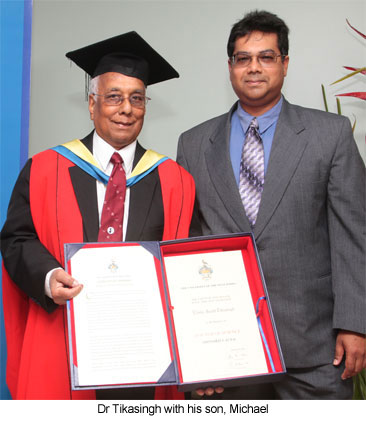
 
Today is truly an important day in my life. I have been through three graduation ceremonies and have seen distinguished people received honorary degrees, but I never thought that one day I, too, might receive such honour. I want to thank this prestigious University for so honouring me. I will always cherish this moment.
I owe a debt of gratitude to my parents, moreso to my mother. My father had died when I was 12 years old. It was my mother who struggled and also found the means to send me to high school. My thanks are due to them.
I also doubt I would have accomplished much without the full support of my wife and my son. I regret very much that my wife isn’t with us to witness this event. I was also fortunate to have good bosses, technicians and supporting staff in the institutions where I worked. They were all helpful to me and I thank them all. Reflecting on my staff, I must say that our human resources in Trinidad and Tobago are excellent and perhaps second to none.
To those who are graduating today, you, too, can say that today is an important day in your life. You have worked hard, burnt the proverbial “midnight oil” and made many sacrifices to reach this far. Congratulations to you. Congratulations are also in order for your parents and guardians who have brought you this far. Not long ago, they probably bit their finger nails off when you took your Common Entrance examination and, if any finger nails were left, those too would have been bitten off when results of the examination were about to be announced! Today they stand proudly behind you.
I am not sure if you will remember what I say here this morning. I certainly do not remember what any of the graduation speakers said when I received my degrees. So, if you do not remember anything I say this morning, I will understand.
What I would like to do is to share some of my experiences with you with the hope that there might be something in them which might be of help to you.
Before I was employed I received a Rockefeller Foundation Fellowship to study arboviruses at the Trinidad Regional Virus laboratory. One of the persons who interviewed me for the Fellowship was a very distinguished, but humble man by the name of Dr Max Theiler. Dr Theiler had won the Nobel Prize for Medicine in 1951 for his development of the Yellow Fever vaccine. Despite the fact he was a busy man, he spent some time with me, explaining the work of the Rockefeller Foundation on arboviruses. This was something that could have been done by any of his junior staff members, but no, he did it himself. After he was finished, he took me to meet and chat with all of his senior staff members. Again he could have asked one of his staff to take me around, but he did it personally. I was impressed by his easy style and humility.
My first job was at the Trinidad Regional Virus Laboratory. The Laboratory needed many specialists in various fields such as epidemiology, virology, serology, mammalogy, entomology and other “ologies.” We did not have all these experts so some of us had to double-up to do the work required. I met very seasoned researchers and I was just out of graduate school. So I was the lowest man on the totem pole! And yet we worked as a team.
My first duties were to visit each section of the laboratory to learn the various techniques. That accomplished, I was sent out into the forests with mapepire snakes, and into the swamps with anacondas and caimans. These field trips were to collect various animal species and bring them back to the laboratory to test for the presence of viruses. And you know what? I enjoyed every minute of it. Sometimes, I used to wake up in the morning and say a little prayer: “Dear God, I am so thankful for my job. I am having so much fun and even getting paid for it!” You have selected your own area of interest, so enjoy it.
 In the laboratory it was all teamwork—all working for the common good of the laboratory. There was no bickering. There was no quarrel as to who would write a particular research paper. To my knowledge there were none of these negatives. The laboratory was successful. In fact, the laboratory was well known around the world in the field of our endeavour. Much of today’s research, and work in the corporate world consists of teamwork, so one must learn how to fit within the organization so that there is synergism. Everybody counts in the organization, from the bossman down to the cleaners and maintenance people. So you must recognize the contribution of each individual in the team. By the way, you will find that giving a word of praise to someone here and there will go a long way.\ In the laboratory it was all teamwork—all working for the common good of the laboratory. There was no bickering. There was no quarrel as to who would write a particular research paper. To my knowledge there were none of these negatives. The laboratory was successful. In fact, the laboratory was well known around the world in the field of our endeavour. Much of today’s research, and work in the corporate world consists of teamwork, so one must learn how to fit within the organization so that there is synergism. Everybody counts in the organization, from the bossman down to the cleaners and maintenance people. So you must recognize the contribution of each individual in the team. By the way, you will find that giving a word of praise to someone here and there will go a long way.\
As you leave the hallowed halls of the University and enter the world of work, you must remain dedicated, faithful and loyal to your profession. I remember the story of the engineer in the movie “The Bridge on the River Kwai.” The engineer was asked to build a bridge across the river for the enemy. Although he was a prisoner of war he committed himself to build the bridge. He built the bridge with the materials he had at hand and under difficult conditions. In the end he was very proud of what he achieved. He did not say to himself that I will build this bridge with a weak spot so when the enemy crosses the bridge it will collapse. No! He built the bridge in the highest tradition of his training and profession. So never compromise your profession even under adverse situations. Always commit yourself to doing the best of your ability. Really, that is all you can do.
In keeping with the highest tradition of your profession is your own integrity. They go together. To do this you must be honest with yourself. Don’t let other people whittle it away from you. It is your passport. Maintain it and defend it with all your might. As General Douglas McArthur once said “it is the age-old struggle—the roar of the crowd on one side and the voice of your conscience on the other.” I hope you will always listen to the voice of your conscience.
Many students from this University have gone on to serve in many capacities in the countries of the Caribbean and elsewhere. They have done very well and made useful contributions to their communities. They have made their University proud. You too, should follow these examples and make your own contributions to society.
So you have made it through high school and university. You have been successful. Success breeds success. To whom much is given much is expected. Carry on from here. Continue your learning and be a perpetual student. The “journey now start”! \
May God continue to bless each and every one of us. I thank you.
This is the address given to graduates of the Faculties of Science and Technology, and Food and Technology, at UWI, St Augustine, on October 24, 2013.

|





